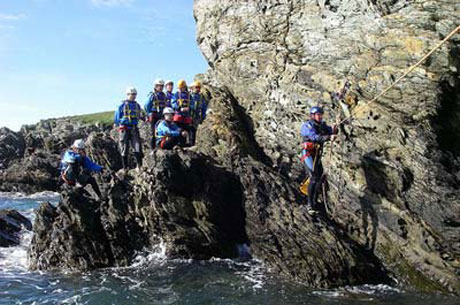
Coasteering
Sharron talks about this new sport that is gaining popularity.
Dai: So, you mentioned coasteering. What is that?
Sharron: Right. What it is, it's organized by some groups of people. It can be quite dangerous but it's very well-run in that you all go out in wetsuits, and you'll go out for a few hours around the coast and what you basically do, is you're walking around the rocks of the coast right on the sea level, so areas that you can't actually walk around the coast on the rocks, you jump in the sea and swim, so lots of people like to do that, cause it's a little more dangerous with the sea currents and all the activities. You know, you could get stuck and ... but, you know, it's handled very well and it's quite a thrilling sport to do.
Dai: So, I guess you can like do jumping into the sea ...
Sharron: You jump in. They mainly ... you know they do it carefully, they mainly get you to jump in. Where you can't climb the rocks, you jump in and swim round to another area. You can climb up and it's just basically going from cove to cove on the sea ... on the sea level ... and around the sea rather than being up on the cliff, on the land walking around seeing the scenery you're actually down ...
Dai: Have you had a go at it?
Sharron: No, but I would like to. I can't find anybody to go with me yet.
Dai: So, if I was going to do coasteering, what kind of equipment would I need?
Sharron: I think they provide you with a full length wetsuit and the shoes that go with it as well. You'd also need ... probably to be a pretty good swimmer. You can't really go unless you can swim pretty well. But they have guides with you all the time. You don't go out in a group and do it on your own because that's far too dangerous. They know exactly the best places to go and I think it would probably cost, a day's activity like that, would probably cost you thirty pound each, I would imagine. I haven't been myself so I don't know exactly but ...
Dai: Thirty pounds.
Sharron: Yeah. Which is quite a lot of money but it is good fun and it's not something you'd do every day. It's a, you know, once a year ...
Dai: Sounds pretty reasonable, to me, for a day.
Sharron: Well, there's some beautiful things you can see. You see a lot more from that level down at the sea than you would ...
Dai: Oh, right. OK.
Sharron: Very often you'll have things like the sea lions or whatever you see close up the seals, sorry not the sea lions. You'll see close up and lots of different fish and things that you may not get to see.
Dai: Any sharks?
Sharron: I don't think so.
Dai: OK.
Sharron: No dangerous ones anyway. But you may see dolphins. We do have dolphins that come up and ...
Dai: ... oh nice
Sharron: Yeah, really good. I don't think they come very close but then, you know, they can be seen.
well-run

It's very well-run.
When something is well-run that means it is very organized. Notice the following:
- That hotel is very well-run.
- It is not a well-run business. They are losing money.
stuck
You could get stuck by the sea current.
When you get stuck that means you are forced to stay in one place. Notice the following:
- I can't come now. I am stuck in a meeting.
- Bob got stuck in traffic.
handle
The tour is handled very well.
When we handle something that means we take care of it. Notice the following:
- Joe handles, all the overseas clients.
- Do you think you can handle the meeting today?
not something you do every day

Swimming with dolphins is not something you'd do every day.
We use the phrase 'not something you'd do everyday' to talk about an activity or experience that is very unusual. Notice the following:
- In Europe seeing an elephant walk down a city street is not something you'd see every day, but in Bangkok it is.
- Meeting the President is not something you'd do everyday.
reasonable

That sounds pretty reasonable.
The word reasonable can almost always be replaced by 'OK'. Notice the following:
- The food is not delicious but the prices are reasonable.
- It is not reasonable for you to do the work of two people.
Vocabulary Quiz
do every day• reasonable


















